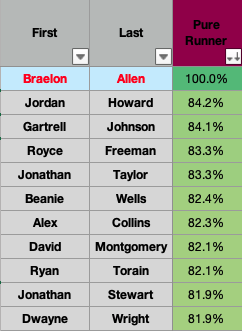This article is part of a series in which I evaluate current college running backs solely on their ability to run the ball. I previously did the same sort of analysis focused on the 2022 rookie running back class, and you can find those articles, as well as explanations of my methodology, here and here. Otherwise, feel free to skip to the player-focused analysis below.

Wisconsin’s Braelon Allen was recruited as a linebacker after playing safety and running back in high school. He ended up in the Badgers’ offensive backfield and did quite well for himself as a freshman last season. On 186 carries, the 6-2, 238-pounder gained almost 1,300 rushing yards and scored 12 touchdowns. While he only caught eight passes, his stats were good enough for a 32.5-percent Dominator Rating. A 95th-percentile mark for true freshmen.
Allen managed that while not rushing more than seven times in a single game until the year’s fourth contest. And while not having reached his 18th birthday until almost a month after the Badgers’ season had ended.
All of that is well and good. But it doesn’t mean much if Allen can’t tote the fuckin’ rock with efficiency. Let’s see how he stacks up in that area.
The Metrics
While Braelon Allen himself was a four-star guy, the other running backs at Wisconsin averaged a collective 2.73 stars as high school recruits, making them a 29th-percentile group of teammates (among those of backs who would go on to be drafted since 2007). Given the talent level of those backfield mates and the volume that Allen saw last season, historical data indicates that we would expect an NFL-quality running back in Allen’s situation to average 0.61 yards per carry greater than the other runners on his team. In reality, Allen’s YPC+ mark came in at 1.88; more than three times better than expected and good enough for the 92nd-percentile.
Part of the cause of that plus efficiency was Allen’s ability to generate big plays. He ripped off chunk gains of 10+ yards at a clip 5.4-percent greater than other Badger backs. He converted those chunk runs into breakaways of 20 yards or more at a 43.8-percent clip. Those numbers are good for a Chunk Rate+ in the 86th-percentile and a Breakaway Conversion Rate in the 95th-percentile.
Allen’s team-relative efficiency stats are impressive at face value. Even more when considering he posted them seeing incredibly high box counts relative to the other backs at Wisconsin. The average box for Allen was 0.40 defenders heavier than the average box for the collective other Badger runners; a discrepancy in the 99th-percentile.
Given those high box counts, the average Allen carry was worth 161.4-percent the output of the average carry from his teammates. A 97th-percentile Box-Adjusted Efficiency Rating.
Allen paired that high overall efficiency with consistently positive per-carry output. He produced a 7.9-percent Relative Success Rate that lands in the 87th-percentile.
Rushing Efficiency Score and Comps
There’s really nothing to poke holes about in Braelon Allen‘s rushing efficiency profile so far in his career. My process combines percentile scores in all the above metrics (in addition to adjustments for overall team quality and strength of opponent) to generate composite scores that quantify a player’s overall performance on the ground. In my process’ main composite, Allen earns an 85.2 out of 100. The third-highest score among guys for whom I have box count data. Behind only Devon Achane and Kenneth Walker.
Using the same metrics that go into those rushing efficiency composites (in addition to physical measurables), I am also able to generate similarity scores between current and past prospects as a way of formulating comps. Using historical height and weight gain data for eventual NFL running backs, I project Allen to be 6-1 and 230-pounds at his eventual Combine weigh-in. If he runs a 4.55 40-yard dash at that size (dude is a workout warrior and reportedly ran a 4.62 in high school), the following players will be his ten closest comps from a “pure runner” perspective:

There’s a lot of quality NFL runners on that comps list. My personal favorite match for Allen is Beanie Wells. Like Allen, Wells was a big, fast dude who was very efficient and very productive on good teams in the Big Ten. He also wasn’t much of a pass-catcher. Wells struggled with injuries as a pro. But he had over 1,000 rushing yards and was the RB18 in per-game PPR points in 2011.
Last Word
Braelon Allen could be headed for similar NFL success. But I think I need to see it one more time before I’m all in. His numbers were tremendous last season, but in a weird way, they almost feel too good to be true. If Allen can follow up a great freshman campaign with another year of efficient play (even if he doesn’t reach the ridiculous standard he set in 2021), I will be fully bought in on him as an elite devy running back.


